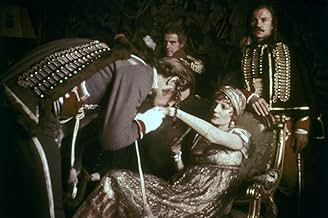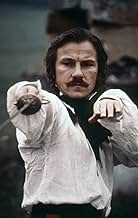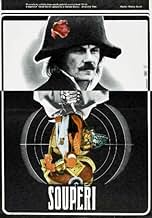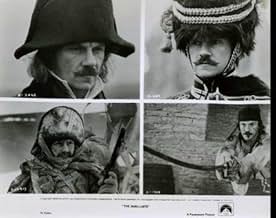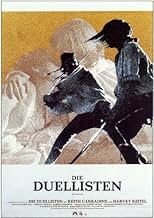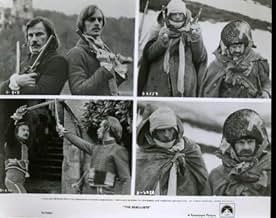AVALIAÇÃO DA IMDb
7,4/10
29 mil
SUA AVALIAÇÃO
Keith Carradine e Harvey Keitel estrelam este drama sobre dois agentes do exército de Napoleão que entram em um confronto violento em uma série de duelos.Keith Carradine e Harvey Keitel estrelam este drama sobre dois agentes do exército de Napoleão que entram em um confronto violento em uma série de duelos.Keith Carradine e Harvey Keitel estrelam este drama sobre dois agentes do exército de Napoleão que entram em um confronto violento em uma série de duelos.
- Direção
- Roteiristas
- Artistas
- Indicado para 2 prêmios BAFTA
- 2 vitórias e 4 indicações no total
- Direção
- Roteiristas
- Elenco e equipe completos
- Produção, bilheteria e muito mais no IMDbPro
Avaliações em destaque
The best issue about this movie, other than, of course, the aesthetic perfection, is its absolute fidelity to Conrad's short novel. I think this is very good in the movie because the book is so good, and it would have made no sense try to change it in the least way, as it often happens when movies come out of books (for example, Kubrick always made his films somehow look different from the books they are taken from, and I should say often improved them, but in many other cases it's true the opposite). It's noteworthy saying that in another, more popular, Ridley Scott's movie such as Blade Runner, always derived from a novel, important changes have been made from the original story ( in that case, all the part about the 'empathy' religion doesn't appear in the movie, and I think it was a good choice to omit it). But ' The Duelists' had to stick to the book! The point about the Duelists is all about the rich simplicity of its being a movie: Ridley Scott just takes the story as it is, and it's a damn good one, and he tells it to us in the best possible way, with an incredible attention to the graphical details (the duel scenes are just one better than the other), and an amazing use of the camera (the boxing scene, the horse riding duel). Now, going back to the story, in less than 100 pages, Conrad managed in explaining everything about the great illusion of Napoleon's empire, without the emperor ever appearing in it. It's incredible how he managed making the ever lasting duel between the two officials a great metaphor of that age, still keeping the two characters real and alive. The movie gives you all this. Watch it!
After making a string of acclaimed adverts, Ridley Scott followed fellow ad man Alan Parker onto the big screen with his debut movie.
The Duellists was based on a tale by Joseph Conrad (who inspired Apocalypse Now and the ship names for his 1979 feature, Alien - Nostromo and Narcissus).
As you my expect from Ridley, every scene looks gorgeous and is obviously the mark of a man moving from 30 second promotional films into the big screen world.
Harvey Keitel (later to star in Thelma and Louise) and Keith Carradine are the Hollywood stars acting alongside a wealth of British thesps including Albert Finney, Diana Quick, Tom Conti, Pete Postlethwaite and Veronica Quilligan (later to play the innocent protagonist of Neil Jordan's Angel).
The movie is clearly inspired by Stanley Kubrick's Paths of Glory and Barry Lyndon and looks like a dry run for Gladiator's battle scenes.
It deals with the themes of honor, obsession and violence. Needless to say, the futility of war and the destructive nature of revenge leads to the twist that both men have been duelling for so long, in the end they actually forget what it was that set them off on their feud.
The duels are stunning, the attention to detail is meticulous and the movie won a string of awards, including 'Best Debut Film' at the 1977 Cannes film festival.
Top trivia
* The budget was so tight that Scott was forced to use producer David Puttnam and other crew members as extras.
This was an extension of his earlier short films, a potted version of Paths of Glory in which a handful of extras (including Tony Scott) go over the wire and run round the camera before repeating the exercise. Smoke and editing hide the fact that there were so few people involved.
*The Duel, as it was originally called, was to be made for French TV as a one-hour film.
*The scene where the French army is bogged down was shot in a ski resort near Inverness.
*After EMI turned down the script, Scott flew the project to Chicago and the company Hallmark...
*After the French deal collapsed and the $700,000 budget proved too rich for Hallmark's blood, one of the bosses saw its potential as a film and suggested that Scott try and make it as a movie.
*The eventual budget was a mere $900,000. Scott clinched the dealing by telling Paramount he would put up a completion bond and that he would start pre-production on the day of the meeting. He would start shooting within a couple of months.
The thought of filming a movie like that in September left the suits slack of jaw.
In the sun-kissed world of la la land, making a Joseph Conrad movie in Winter sounded like a nightmare.
*Scott had originally wanted to make a Western but lacked the cash to fly off to Monument Valley and the locations of other such classic John Ford Westerns.
The Duellists was based on a tale by Joseph Conrad (who inspired Apocalypse Now and the ship names for his 1979 feature, Alien - Nostromo and Narcissus).
As you my expect from Ridley, every scene looks gorgeous and is obviously the mark of a man moving from 30 second promotional films into the big screen world.
Harvey Keitel (later to star in Thelma and Louise) and Keith Carradine are the Hollywood stars acting alongside a wealth of British thesps including Albert Finney, Diana Quick, Tom Conti, Pete Postlethwaite and Veronica Quilligan (later to play the innocent protagonist of Neil Jordan's Angel).
The movie is clearly inspired by Stanley Kubrick's Paths of Glory and Barry Lyndon and looks like a dry run for Gladiator's battle scenes.
It deals with the themes of honor, obsession and violence. Needless to say, the futility of war and the destructive nature of revenge leads to the twist that both men have been duelling for so long, in the end they actually forget what it was that set them off on their feud.
The duels are stunning, the attention to detail is meticulous and the movie won a string of awards, including 'Best Debut Film' at the 1977 Cannes film festival.
Top trivia
* The budget was so tight that Scott was forced to use producer David Puttnam and other crew members as extras.
This was an extension of his earlier short films, a potted version of Paths of Glory in which a handful of extras (including Tony Scott) go over the wire and run round the camera before repeating the exercise. Smoke and editing hide the fact that there were so few people involved.
*The Duel, as it was originally called, was to be made for French TV as a one-hour film.
*The scene where the French army is bogged down was shot in a ski resort near Inverness.
*After EMI turned down the script, Scott flew the project to Chicago and the company Hallmark...
*After the French deal collapsed and the $700,000 budget proved too rich for Hallmark's blood, one of the bosses saw its potential as a film and suggested that Scott try and make it as a movie.
*The eventual budget was a mere $900,000. Scott clinched the dealing by telling Paramount he would put up a completion bond and that he would start pre-production on the day of the meeting. He would start shooting within a couple of months.
The thought of filming a movie like that in September left the suits slack of jaw.
In the sun-kissed world of la la land, making a Joseph Conrad movie in Winter sounded like a nightmare.
*Scott had originally wanted to make a Western but lacked the cash to fly off to Monument Valley and the locations of other such classic John Ford Westerns.
Seems this film has left most viewers with only positive comments to make (quite rare actually). I agree with most of them.
This is a very believable film and is beautiful to watch in parts thanks to Scott's eye for design and natural beauty, esepecially regarding the use of light.
I was mesmerised to know how it was all going to end. I was so sure it was going to end tragically but then was surprised and elevated by the ending that showed the richness & depth of the human experience. I believe there's some meaning for us all in this movie. And I got to hear about this movie by accident!
An amazing quality of a film overall when you read about it's history, which was almost not made!
8/10
This is a very believable film and is beautiful to watch in parts thanks to Scott's eye for design and natural beauty, esepecially regarding the use of light.
I was mesmerised to know how it was all going to end. I was so sure it was going to end tragically but then was surprised and elevated by the ending that showed the richness & depth of the human experience. I believe there's some meaning for us all in this movie. And I got to hear about this movie by accident!
An amazing quality of a film overall when you read about it's history, which was almost not made!
8/10
This /is/ one of the best sword-fighting movies ever made, in that the choreography doesn't look like choreography. In the fight sequences, there's that rare sense of reticence, chance, uncertainty: of men thinking while they fight and trying to stay alive (The battle scenes in Kurosawa seem to me to share the same quality).
What sets this film apart (beyond its sheer visual gorgeousness) is its unremitting humanity and realism. Carradine as the protagonist is a decent enough, reasonable enough chap trying to live by an unreasonable and inflexible code. Keitel as Feraud is a cipher: charged with a wholly unreasonable hate the sources of which we never see. The movie steps through the ups and downs of war, fashion, politics. Though the film's structured around a series of violent combats, the struggle is finally a moral one. One man finally transcends the ideal of honor that's kept him a prisoner for fifteen years. The other is unable to.
This is a movie to watch, and to recommend to one's friends. It's lamentably not available yet in DVD, but can be found occasionally as a rental. Watch it for the costumes, the lighting, and the gorgeous camerawork. Watch it again for a movie that takes on The Big Issues. Brilliant.
What sets this film apart (beyond its sheer visual gorgeousness) is its unremitting humanity and realism. Carradine as the protagonist is a decent enough, reasonable enough chap trying to live by an unreasonable and inflexible code. Keitel as Feraud is a cipher: charged with a wholly unreasonable hate the sources of which we never see. The movie steps through the ups and downs of war, fashion, politics. Though the film's structured around a series of violent combats, the struggle is finally a moral one. One man finally transcends the ideal of honor that's kept him a prisoner for fifteen years. The other is unable to.
This is a movie to watch, and to recommend to one's friends. It's lamentably not available yet in DVD, but can be found occasionally as a rental. Watch it for the costumes, the lighting, and the gorgeous camerawork. Watch it again for a movie that takes on The Big Issues. Brilliant.
The whole touch and "feel" of this marvellous movie is like slowly sipping a wonderfully rich and satisfying glass of superb wine. At regular moments throughout the film, the director takes the time to give you a photographic setting of the scene and you feel like you're looking at some great painting or masterpiece on canvas while still looking at a piece of atmospheric photography. The duelling is rivettingly realistic and the characters of the two main protagonists are rounded, deep and fascinating. Keitel is just a plain nasty man who is arrogant, hate-filled and remorselessly vindictive, never forgetting an enemy, even one of his own creating from an imagined slight. The resulting feud drags on for about 15 years, with Keitel determined to avenge himself and kill his more honorable and sometimes rather bemused arch-enemy out of blood-lust, pure vindictiveness and a desire to inflict a humiliating defeat - something he is repeatedly denied. The end solution is perfect. Sit back and enjoy a brilliant and ageless portrayal of two men caught up in the Napoleonic Wars, including the mercilessly cold Retreat from Moscow. Usually I don't particularly care for this kind of repeat-fighting gendre of a movie but this somehow manages to climb out of that kind of a mire. Out of 10, I rate this another flawless 10.
Você sabia?
- CuriosidadesSir Ridley Scott said that after having directed anywhere from 1,500 to 2,000 television commercials, he realized no one was going to approach him about directing a film, so he'd have to take the lead. Since his funds were limited, he used a public domain source for the story, and commissioned the script for this movie on his own.
- Erros de gravação(at around 1h 23 mins) Faraud, loading his pistol, drops a ball into the barrel and then rams it into place. When the ball drops,a metallic sound is heard, indicating that there is no powder in the barrel.
- Citações
Armand D'Hubert: General Feraud has made occasional attempts to kill me. That does not give him the right to claim my acquaintance.
- Cenas durante ou pós-créditosOpening credits prologue: STRASBOURG 1800
- ConexõesFeatured in Moviedrome: Double Bill - The Duellists/Cape Fear (1991)
- Trilhas sonorasBist du bei mir
(uncredited)
Music by Gottfried Heinrich Stölzel
from "Notenbüchlein für Anna Magdalena Bach No. 25. BWV 508"
Written by Johann Sebastian Bach (uncredited)
Principais escolhas
Faça login para avaliar e ver a lista de recomendações personalizadas
Detalhes
- Data de lançamento
- Países de origem
- Idiomas
- Também conhecido como
- Los duelistas
- Locações de filme
- Château de Commarques, Dordogne, França(final pistol duel)
- Empresas de produção
- Consulte mais créditos da empresa na IMDbPro
Bilheteria
- Orçamento
- US$ 900.000 (estimativa)
- Faturamento bruto mundial
- US$ 568
Contribua para esta página
Sugerir uma alteração ou adicionar conteúdo ausente



